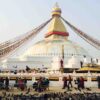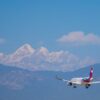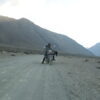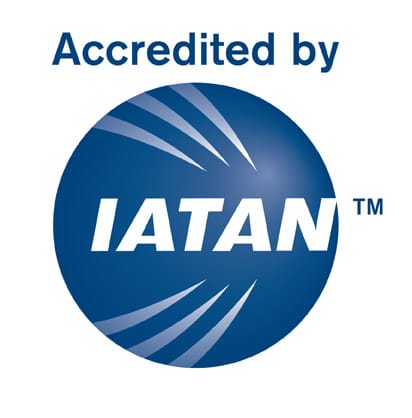Kilimanjaro Guides & Porters
Kilimanjaro guides, porters, and other crew make up an essential part of a true Kilimanjaro experience. One of the most renowned mountaineers of the 20th century, Peter Boardman gave an apt description of guiding brethren:
“Their lives are linked by a love and profession to the mountains, and their company will enhance the experience of all those who wish to approach the mountains and learn.”
This is very true here in Kilimanjaro – the guides’ job is not just to make it possible for you to reach the mountain peak safely and sound, but also to make sure that the days that you’ll spend on these slopes are amusing and memorable. And it’s not simply a job – it is a lifestyle and, in some ways, an outlook. It makes the Kilimanjaro guides quite different from those found on the slopes of other popular mountaineering destinations.
We have many clients who climbed Mt Kilimanjaro years ago. Most of them don’t remember the names of routes, camps, or how the landscape looked, but all of them remember the names of their guides. Our Kilimanjaro team leaders always leave a special imprint on climbers, and their skills largely determine if the climb will be successful or not.
Therefore, when selecting your Kilimanjaro adventure, choosing your guide is the first and foremost decision to make.
Must-have Skills of our Kilimanjaro Local Guides
Each and every Kilimanjaro Local guides possess deep knowledge of a number of things. Briefly, their competencies may be put into two distinct groups. The first type, so-called “soft” skills, are needed to make the experience enjoyable, amusing, and memorable for you and for the crew. The second, “hard” skills – are needed to handle the practical needs of the expedition, such as camp management, crew composition, pathfinding, emergency response, and others.
“Soft” skills
- Rapport and communication – often overlooked, these skills are one of the most essential to make your Kilimanjaro experience a lifetime memory. Kilimanjaro trekkers arrive from various countries and have different social backgrounds. While some are talkative and sociable, others may be more reticent and introverted. The first minutes together are enough for our guides to understand what type of a person they are taking to the peak of Kilimanjaro, and they will adapt their behavior accordingly. You will never find them obtrusive or boring.
- Leadership and encouragement – a head guide of a Kilimanjaro expedition is not just showing the way to the summit, he actually leads the expedition. In practice, that means he is making sure that the hikers do not lose their motivation while moving closer to their goal. Summit night is often a challenge, and the guide’s task is to reinvigorate climbers, encourage them, and boost their stamina.
- Teamwork and crew management – though most of the time you will be in contact with the guide, one should always remember that the safety and success on a Kilimanjaro adventure are a result of a collaborative effort of many people: the guide’s assistants, camp masters, cooks, and porters. A professional experienced Kilimanjaro local guide is responsible to make sure that there is cohesion and cooperation in his team at all times.
- Good English-speaking skills – while any tourism professional working with international clients is expected to be proficient in English, in practicality finding a mountain guide with proficient English is quite a task. All of our guides are fluent in English and able to communicate easily with clients.
“Hard” skills
- Medical training and first-aid in the high altitudes. A guide’s first priority and utmost responsibility is the safety of every client. All of our guides are trained in both basic first-aid, but also have wilderness first-responder certificates, and have training in high altitude safety.
- Preserve life – a guide should do everything which is required to make sure an injured person survives until full medical aid is available.
- Relieve pain – a competent mountain professional should be capable of minimizing pain (both physical and emotional) of a sick client.
- Prevent harm – everything should be done skilfully to ensure that the condition of an injured person does not get worse and the possibility of full recovery is preserved.
Major accidents are relatively rare on Kilimanjaro – only recorded once in a decade on certain parts of the mountain. A more important and common concern is acute altitude sickness or AMS. This is a concern for climbers on any mountain of significant altitude and Kilimanjaro is no exception. A skilled guide should be capable of diagnosing this sickness at the very earliest stages, treating it to minimize long-lasting impacts, and organizing evacuation if necessary.
- Rescue & Evacuation operations: In case an emergency happens, a Kilimanjaro guide should be able to organize a safe and fast evacuation of a sick person to a medical facility. In practice, it means that a guide should be able to: (a) get in contact with a helicopter rescue service; (b) comprehensively explain the location to the pilot and the concerns to a ground medical team; (c) prepare a sick person for transportation and prevent any further harm.
When helicopter evacuation is not necessary, the guide should be able to organize manual transportation on a special stretcher.
- Mountain topography knowledge: Professional Kilimanjaro guides should know every nook and cranny of the mountain. If for some reason the hiking team has to get off the established trail (e.g. in case of heavy rain), the guide should choose the shortest and safest way to the nearest camp or down to the exit. Some of our guides worked on the Mt Kilimanjaro rescue team and know how to get to certain destinations in a fast manner.
- Strong flora and fauna knowledge: We believe that your Kilimanjaro adventure should not be just safe and successful – it should also be insightful and entertaining. After all, Kilimanjaro has a unique ecosystem, with some plants to be found nowhere else on the globe. With some luck, you have a chance to spot some wildlife on the trail. A skilled guide should be capable of telling you more about the vegetation and the animals of Kilimanjaro in an easy-going, yet interesting manner.
So, you can expect the following from our Kilimanjaro local guides:
- High Safety Standards – Our highest priority is your Safety. When you trust and book with us we will not take that responsibility lightly. Our guides are certified Wilderness First Responders (WFR), which means they have the tools to make critical medical and evacuation decisions. They receive annual training in emergency first aid and can prevent, recognize and treat altitude-related illnesses. Additionally, they can identify and avoid potential hazards such as slippery trails and loose rocks. Your health will be monitored very closely day to day while trekking.
- Professionalism – At Nature Horizons Tours we believe that professionalism is the key to your successful Kilimanjaro climb. We are sure that you have many choices when it comes to the Kilimanjaro trek. We always go beyond our client’s expectations.
Nature Horizons Tours takes pride in the hard work of our staff and we strive to maintain and grow our reputation of excellence. Our guides uphold a high level of professionalism while still keeping the experience fun for the clients.
- Climbing Knowledge – Kilimanjaro trails are clearly marked, so following a trail should not pose a problem. But there are more intricate things that your guide will take into consideration when deciding when, where, and how to move the party. These things include weather conditions, trail density, rest stops, pace, etc.
- Mountain Facts – Your guide is knowledgeable about general mountain facts. He can tell you about the climate zones, the altitudes of and distances to campsites, and information about the geology, flora, and fauna. These types of facts increase the enjoyment during the trek by giving you an idea of what you are seeing and feeling.
Our Kilimanjaro local guides understand and are aware that customer satisfaction, a safe and successful climb is one of our company’s core values.
Kilimanjaro Porters
Kilimanjaro porters are the backbone of every expedition and a very special breed of mountaineers, whose physical fitness and stamina always draw the surprising looks of Kilimanjaro trekkers. Trudging uphill, the exhausted hikers are often astonished to see the galloping team of porters, heavily loaded with camping equipment, seeming to have no difficulties whatsoever.
The porter crews have many important responsibilities, such as:
- Carrying the camping equipment and supplies: While climbing Mt Kilimanjaro, you will notice that the tent, which you leave in the morning by some magical force, re-appears in the next one, pitched, cleaned, and ready for you. The magic is easily explainable; the team of porters, coordinated by the camp master, disassemble your tents in the morning immediately after your departure, pack them, then outpace the trekkers to make sure the tents are cleaned and pitched again in the next camp.
- Apart from carrying the tents you sleep in, the porters are also tasked with carrying other camp essentials – dining (mess) tent, chairs, tables, food, and water supplies. Here at Nature Horizons Tours, we rigorously control that each porter’s load does not exceed 15 kg.
- Carrying your gear: Each climber has 10-14 kg of personal gear which he or she will use on a certain day of the trip. All this is packed in a special duffel bag (you may read more about the gear here) and one of the porters will be carrying it up to the summit camp.
- Fetching water: There is no plumbing in the high-altitude camps of Mount Kilimanjaro. The porters fetch water for drinking, hygiene, and cooking from the nearby mountain springs. Though most of the camps are near the sources of water, once the group arrives at the summit camps the task becomes much more challenging. Porters have to walk with cans about 5 km down to the spring, collect water, and then hike back to the camp. Rainy or windy conditions are never an excuse – the camp and the kitchen cannot stay without water.
- Serving meals in the dining (mess) tent: Some of the porters will work as “waiters” – they will be bringing the meals and drinks from the kitchen tent and serving them. After the hikers finish and go resting (or hiking), these porters will wash the dishes and prepare the kitchenware for the next meal.
- Collecting trash: The beauty of Mt Kilimanjaro should be preserved for future generations, and whatever trash, garbage, and the expedition members produce waste, the special “cleaners” always take it away from the Mountain.
- The work of our cleaning teams is not just restricted to the waste of our expeditions – because we deeply care about the environment of Kilimanjaro, we try to clean even what was left by the irresponsible trekkers led by the other tour operators.
- Assisting the guides on the summit night. Normally, the porters do not summit. Yet, there is a special breed of them – the so-called “summit porters” – who reinforce the climbing crew for the final leg of the trip. These people help the guides to make sure that every hiker is safe and comfortable. Together with your guides, the summit porters will be carrying hot tea, biscuits, and oxygen to make sure that you are warmed and energized to keep trekking to the summit.
- As you can see, the porters on Kilimanjaro have many responsibilities, and we cannot imagine a safe and successful expedition without their support.
Our porters receive three nutritious meals every day, and apart from ugali and beans, their diet includes meat (goat and beef), eggs, potatoes, rice, spinach vegetables, tea, and bread. A simple menu, yet rich in calories and carbohydrates. At Nature Horizons Tours we can proudly say that our porters never go asleep with an empty stomach.
Shoddy tents: Many budget companies are using inferior tents. As a result, their porters often suffer from hypothermia when the weather becomes bad. Every year some of them die, but the climbers are seldom aware of that. We take good care of our porters, so they take good care of you.
Can You Climb Kilimanjaro without a Guide?
No, you cannot: Under the National Parks Mountain Climbing Regulations of Tanzania, each trekking group should be accompanied by a licensed climbing guide.
Under the law, the porters are not a requirement – their participation in the expedition is mostly a result of the evolution of the climbing industry. Some of the Kilimanjaro outfitters are offering “light” packages, where you will be accompanied by the guide only. Yet, this option is suitable for the experienced climbers only, who have taken part in other high-altitude trips and know how to set up a camp, cook meals at altitude and otherwise survive in the wilderness. These climbers should be also physically fit and capable of carrying up to 20 kg of expedition supplies and gear.






